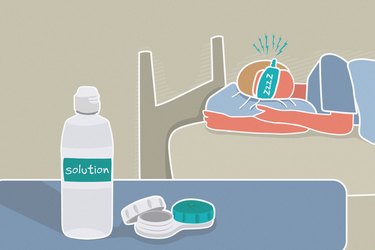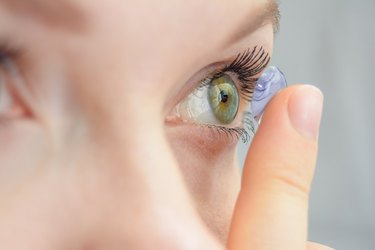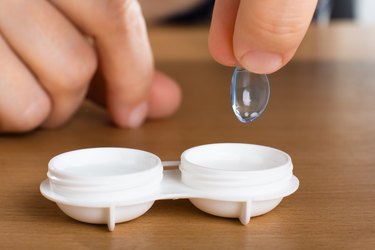
Raise your hand if you've ever snoozed with your contacts in or worn them in the shower. Guilty! You're part of a big group: Nearly everyone who wears contacts lenses — 99 percent — engages in at least one risky habit along these lines, per a 2014 survey from the Centers for Disease Control and Prevention (CDC).
Specifically, the survey found that more than 80 percent of people had showered with their contacts in, and nearly half had napped or slept with their lenses.
Video of the Day
Video of the Day
This behavior may be common, but it's also risky for your eye health.
"People can get lulled into a false sense of security when they do the wrong thing for years and then all of a sudden they have a problem," Andrew D. Pucker, OD, PhD, associate professor at the University of Alabama at Birmingham School of Optometry, tells LIVESTRONG.com.
Always keeping your contacts in your eyes — even while sleeping and showering — can lead to consequences, ranging from mild to super serious.
3 Things That Can Happen When You Don’t Take a Break From Your Contacts
1. Your Eyes Can Feel Uncomfortable
If you've ever drifted off while wearing your lenses, your eyes probably felt desert-level parched when you woke up.
In general, sleeping in contacts can lead to nuisance-level side effects, such as eyes that are red, scratchy or irritated, says ophthalmologist Brian Boxer Wachler, MD, of the California-based Boxer Wachler Vision Institute.
These types of symptoms generally ease up once you remove the lenses.
2. Your Vision May Get Blurry
Other side effects of getting shut-eye in contacts go beyond temporary discomfort.
"When you sleep in a lens or overwear a lens, you don't produce as many tears so the contact lens dries out, which stops the cornea from getting the oxygen it needs," says Scott Drexler, OD, an assistant professor of ophthalmology at the University of Pittsburgh School of Medicine.
This oxygen-deprivation is known as hypoxia. With it, your cornea swells and you may find that your vision gets hazy, per Michigan Medicine. (The cornea is the front, transparent portion of your eye, where a contact lens sites.) Hypoxia can lead to cell damage within the eye, Dr. Pucker says.
There are some contact lenses out there that are FDA-approved for overnight wear, Dr. Pucker points out — they're designed to be extra breathable to allow oxygen through.
But it's still best to remove them before bedtime, Dr. Wachler says. Even sleeping in approved lenses can lead to corneal ulcers or infections, he says.
3. You Can Get an Infection
Your infection risk goes up if you sleep or shower with contacts — with sleeping, for instance, it increases by 6 to 8 times, per the CDC.
Sleeping with contacts in creates a dry, non-oxygenated environment that makes it easy for that little bit of plastic to absorb and spread bacteria. Think about it this way: That dried-out contact is rubbing on the cornea epithelium (that is, the protective tissue covering the cornea), potentially creating a tiny opening, Dr. Wachler says. This micro-opening is a portal for bacteria to get into the cornea.
Once in the cornea, bacteria cause corneal ulcers, an infection known as keratitis.
Keratitis is "usually mild," Dr. Drexler notes — a course of eye drops can treat the problem.
But in some cases, keratitis causes scarring on the cornea, per the American Academy of Ophthalmology (AAO). Severe cases can lead to vision loss, Dr. Drexler notes.
"I don't want to scare anybody, but I've seen patients who needed cornea transplants because of a very bad infection," Dr. Wachler says.
Two kinds of bacteria — Pseudomonas aeruginosa and Staphylococcus aureus — commonly cause bacterial keratitis, per the CDC, which lists sleeping overnight in contacts as a main risk factor. Infections can also be fungal or viral.
"The longer you sleep, the more dangerous it becomes," Dr. Drexler says. That is, napping is probably less of a big deal than a full night's sleep in contacts.
Still, this is a bit of an odds game: You can sleep in contacts many times with no issues. But: "It just takes one time for things to not go right," Dr. Wachler says. "It's rare, but it's still definitely an increased risk versus not sleeping in contacts."
Signs of an Eye Infection
In general, if you have an eye infection, you’ll know it, Dr. Pucker says. Common symptoms are:
- Light sensitivity
- Pain
- Red eye
If you notice any of these symptoms, your first step is to remove your contact lenses, Dr. Pucker says. That’ll resolve a small issue, like a bit of lint stuck under the lens, he says.
“But if [the symptoms] persist, you should for sure see an eye doctor — be it an optometrist or ophthalmologist — that same day to make sure there are no issues,” Dr. Pucker says.
OK, so what about showering with contacts?
Open your eyes in the shower and your lenses are exposed to all sorts of undesirable microorganisms.
"Bacteria, amoebas and funguses are all hanging out in the water around us. That's especially true of tap water," Dr. Drexler says.
When your contact gets hit with water, it can change shape or even stick to your eye, according to the CDC. And this can cause minute scratches and damage to your cornea that give microbes an entry point, Dr. Pucker says.
There are all sorts of microorganisms in the water, but the biggest concern is exposure to acanthamoeba.
"It's an amoeba that lives in water and can cause a very severe eye infection," Dr. Pucker says. An infection from this amoeba is known as acanthamoeba keratitis, which is resistant to treatment, per the U.S. Food and Drug Administration (FDA). It can lead to blindness, per the CDC.
But What if You Need to Wear Contacts Around Water?
Some people have incredibly poor vision — so bad that it’s near-impossible to hop in the shower safely without lenses in.
“If you need to do it, just keep your eyes closed in the water,” Dr. Drexler says. And, when it comes to the pool or hot tub, don goggles to protect your contact-covered eyes.
What to Do if You Slept or Showered in Contacts

Your eye doctor may prefer you never, ever shower or sleep with contacts in, but things happen. Maybe you had an unplanned sleepover or needed to shave your legs in the shower. No need to panic.
Here's what to do:
- Add moisture: "If you fall asleep in your lenses, the first thing you want to do is lubricate them," Dr. Drexler says. That way, you'll restore some moisture to the parched environment. Add a lubricating eye drop (aka artificial tears) to your eye, and let a few minutes go by.
- Take 'em out: Then, take out the lenses, Dr. Drexler recommends.
- Toss or clean them: Throw them out if they're a daily-wear lens and pop in a new pair. Or follow your usual cleaning routine for longer-wear lenses, he says.
If you habitually sleep in your contacts, consider speaking to your eye doctor about the FDA-approved options for nighttime wear — they may not be perfect, but they're likely better than other options.
Tip
If you’re concerned about an infection after sleeping or showering with contacts, keep the lenses even if they’re daily disposables, Dr. Wachler says. That way, you can bring them to the eye doctor, who can use the contacts to pinpoint the organism causing the infection, he says.
So, How Bad Is It Really to Never Take Out Your Contacts?
It's just not worth it.
On the one hand, many infections are easily treatable. And you may find that you never get them at all.
"Thankfully this stuff is rare, and a lot of times it comes down to bad luck," Dr. Pucker says. "The vast majority of people aren't going to have an issue because of showering in their contact lenses," he notes. And that's true too for sleeping in lenses, too.
But if you do get an infection, there's a potential for vision loss (even blindness). Or you may require extensive medical or surgical treatment.
In a 2018 report, the CDC detailed six case studies of people who had poor outcomes as a result of sleeping in contacts — several visited the emergency room for care, two required surgery (including an emergency corneal transplant) and most experienced permanent damage or vision loss.
With these consequences in mind, it's best to remove your contacts pre-bedtime and shower (even if it'll take an extra minute or two).
How to Clean and Store Contact Lenses Properly

"Contact lenses are generally safe, but the people who get in trouble are the ones that are not following the rules," Dr. Pucker says.
Fortunately, following these rules is a simple — and speedy — proposition:
- Wash your hands: Use soap and water to clean your hands before putting contacts in your eyes or removing them.
- Take care of your case: Aim to replace it every three months or so, Dr. Drexler says.
- Use solution — never water: "Don't ever use tap water because we know tap water isn't the cleanest," Dr. Drexler says. And while we hope it goes without saying, never, ever re-wet your contact lens with your saliva. This happens a lot, Dr. Wachler says. But it's a huge no-no: "It's like you're putting them in the jacuzzi of bacteria in your mouth and then putting it back in your eye."
- Don't skimp on solution: Don't top off the solution in your contact lens case, Dr. Drexler says. After you put in your contacts, dump out the solution and rinse out the case with more solution, per the American Optometric Association (AOA). Then, let it air dry.
- Stick to a schedule: If you're wearing daily lenses, throw them out at the end of the day. If you're wearing two-week lenses, don't wear them for a third week. "Replace it on the schedule that's intended for the lens," Dr. Drexler says — as lenses get old, dirty and damaged, the risk of a potential problem or infection increases.
Finally, follow any other instructions from your eye doctor or on the contact lens or solution packaging.
- Centers for Disease Control and Prevention: "Contact Lens Wearer Demographics and Risk Behaviors for Contact Lens-Related Eye Infections — United States, 2014"
- Michigan Medicine: "Contact Lens Problems: Hypoxia"
- CDC: "Corneal Infections Associated with Sleeping in Contact Lenses — Six Cases, United States, 2016–2018"
- American Academy of Ophthalmology: "Contact Lens-Related Eye Infections"
- CDC: "Basics of Bacterial Keratitis"
- CDC: "Basics of Fungal Keratitis"
- U.S. Food and Drug Administration: "Contact Lens Solutions and Products"
- CDC: "Basics of Parasitic/Amebic Keratitis"
- American Optometric Association: "Contact Lens Care"
- CDC: "Water and Contact Lenses"
Is this an emergency? If you are experiencing serious medical symptoms, please see the National Library of Medicine’s list of signs you need emergency medical attention or call 911.
